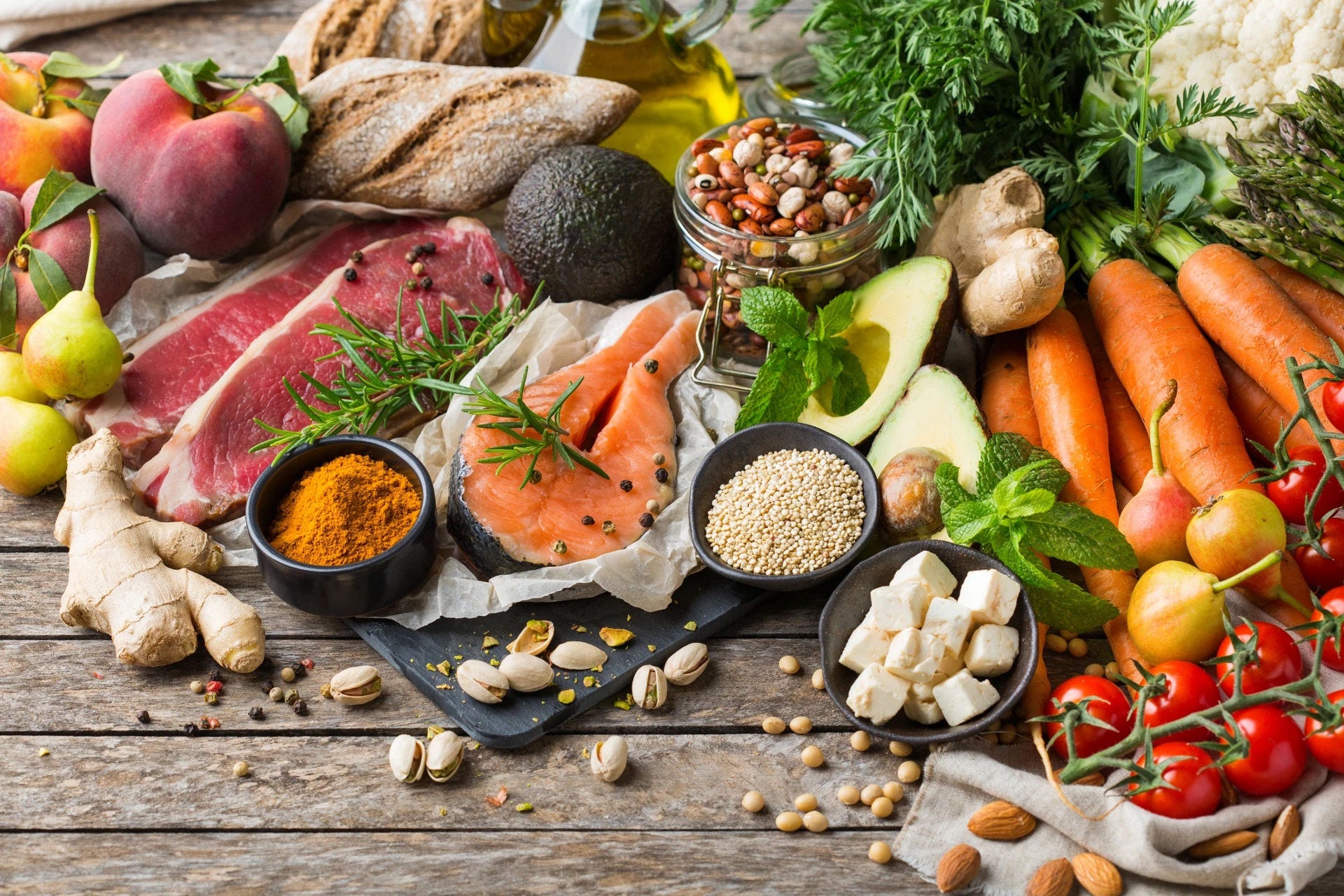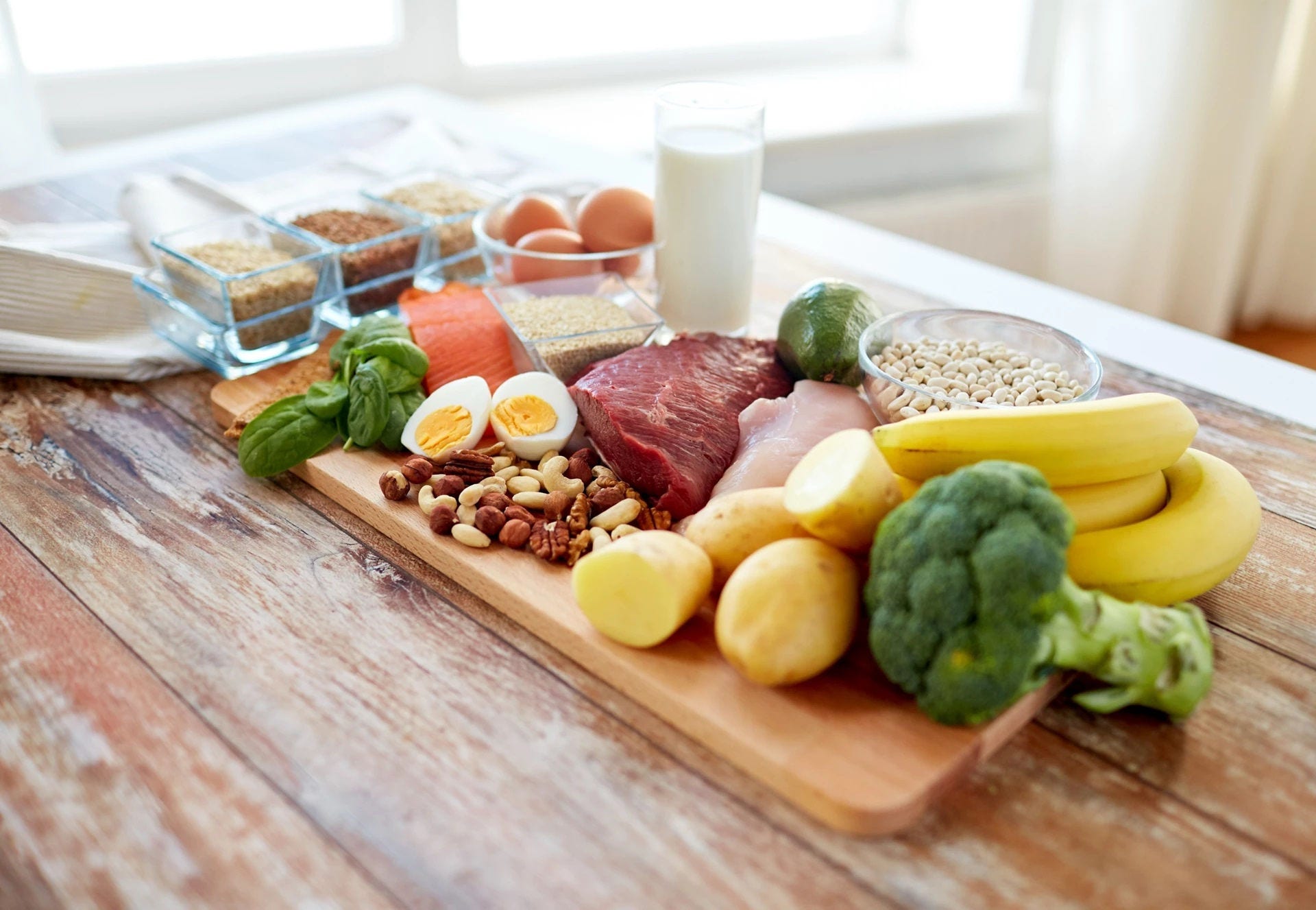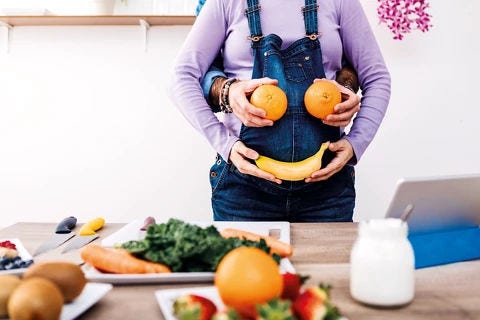Learn more about why diet and nutrition is important when trying for a baby, and what supplements and vitamins to take that may help your fertility.
Pre-conception diet
Preparing your body for trying for a baby needn’t be too complicated or stressful. You are getting ready to carry a new life, and your partner needs to make sure his sperm is fit enough to reach its destination! Think about your eggs and sperm as being the earliest start of your future children; the healthier they are the better. It takes about three months for eggs and sperm to mature so filling your diet with foods that increase egg quality and male fertility before you start trying, will help you to conceive and carry a healthy baby.1
Fertility boosting foods and the mediterranean diet
A plant-based, anti-inflammatory, essentially flexitarian diet is good for all our health, but it is also especially good for improving fertility. Think Mediterranean; lots of colour, the brighter and stronger the better; fresh vegetables and fruit, green, orange, red and yellow, and black and purple berries 2,3. With nuts, seeds, lentils and beans, fish and white meat, wholegrains and olive oil, this diet is stuffed full all the vitamins and minerals that help fertility. Low sugar, complex carbohydrates and good quality animal and plant protein are essential for both male and female fertility, giving you energy, nutrients and the building blocks for eggs and sperm. On the other hand, eating a lot of ultra-processed, fast foods, take-aways and fatty, sugary foods cause inflammation and can harm eggs and sperm.

Caffeine and alcohol when trying to conceive
The research is a bit mixed about these two! And it’s very hard to give everything up in life when you start trying to conceive. However, certainly high intakes of caffeine may impact both male and female fertility3,4, so try and keep your teas and coffees down to the minimum, one or two cups a day.
Alcohol intake should be low for both, men and women, and especially for women during the second half (luteal phase) of the menstrual cycle - a glass on a Friday and Saturday, for example6,7. And no binge drinking!
Foods high in antioxidants for fertility
Antioxidants are compounds in certain foods that help to protect all our cells from damage, and that goes for eggs and sperm too8,9. Vitamins E and C, and the trace minerals zinc and selenium are essential nutrients for fertility.
- Vitamin E is found in dark green leafy greens, nuts and seeds, avocados and olive oil.
- Vitamin C is found in strawberries, citrus fruits, peppers, kiwi fruit and leafy greens.
- Selenium is found in Brazil nuts (just two nuts a day will give you all you need!), chicken and turkey, lentils and garlic.
- Zinc is found in all meats, shellfish, nuts and seeds and pulses
Fertility diet for men and women
You want to eat foods that can improve the way your reproductive hormones work, as well as your egg quality2. A diet rich in nutrients during that crucial period of egg maturation can make all the difference.
- Wholegrains like bread, brown rice and pasta, oats and milled flax seeds contain important B vitamins for your reproductive hormones and compounds called lignans that help ovarian function10.
- Orange vegetables contain beta-carotene for your ovaries
- Almonds and all dark green vegetables are rich in hormone-balancing magnesium
- Cruciferous vegetables like broccoli, brussels sprouts, cabbage and cauliflower help metabolise the hormone oestrogen.
- Iron is also critical for fertility, especially if you have heavy periods (such as in endometriosis) and is found in lean free-range meats, fish, chicken, dark leafy greens, beetroot, dried prunes and apricots11.
- Iodine is needed for the proper functioning of both the thyroid gland and the ovaries and is found in fish and dairy products11.
- High zinc foods are vital for testosterone production, libido and sperm count12.
- Walnuts, hazelnuts and almonds are especially good for sperm (with your two Brazil nuts)13 and vitamin C and E are essential for protecting sperm from damage as they swim along their way to meet the egg12.
- Sunflower and pumpkin seeds contain plant sterols and zinc and tomatoes, especially concentrated tomato paste, and puree and sundried tomatoes are high in lycopene, important for the prostate gland and sperm health. Brazil nuts also contain the amino acid L.
- Arginine, and meat is high in L. Carnitine, both important for sperm production and quality.14
Fertility supplements & vitamins
Supplements for female fertility
Folic acid when trying for a baby
As soon as you consider having a baby, it is recommended you take 400mcg of folic acid or folate which helps to prevent certain birth defects 15. It could be some time before you realise you are pregnant, and these early weeks can be critical. You may have a need for a higher dose of folic acid if you or your partner have certain medical conditions or a family history of neural tube defects, so a quick check in with your GP is a good idea if this applies.
Vitamin D for fertility
Always take a vitamin D supplement in winter, or even in summer if you don’t go out much in the sun, are usually covered or have darker skin. The NHS recommendation is 400iu/10mcg/day. 15
Is a vegan diet good for fertility?
If you eat a vegan diet you might need to supplement with iron, vitamin B1217, iodine and omega-3 from algae because these nutrients are only found in animal-derived products. Also, if you don’t eat oily fish, then supplementing with a good quality omega-3 may be beneficial16
If in doubt about supplements, always consult your healthcare practitioner for advice.
Supplements for male fertility
As for women, it is also recommended for men to take a vitamin D supplement, and a diet rich in vitamins, minerals and antioxidants is considered to be the best for male fertility9. But if you but if you find it hard to always eat healthily, or you have any dietary restrictions, are vegan or vegetarian, it’s a good idea to take an all-round male fertility pre-conception multivitamin containing zinc, vitamin C&E and selenium11. And again, if oily fish is not part of your diet, consider an omega three supplement.
PCOS endometriosis and fertility diet
These complex conditions that affect many women can also cause some problems with fertility. And diet plays a big role in helping to manage them and improving your chances of conceiving.
PCOS fertility diet
Manage your blood sugar; eat plenty of fibre and protein at meals and avoid foods high in sugar and refined carbs which shoot up your blood glucose and interfere with ovulation. Eat magnesium-rich leafy greens and oily fish with omega three fats and foods high in chromium like rye bread, meat and chicken, broccoli and seeds. Drink spearmint tea and consider taking the supplements Inositol and N-Acetyl Cysteine, which have been shown to improve blood sugar control and manage testosterone levels which can be elevated in PCOS18, 19, 20.
Foods to eat to increase fertility with endometriosis
An anti-inflammatory diet and reduction in red meat is essential for managing this often extremely painful condition. Eat plenty of milled flaxseeds, your Mediterranean diet, and spices like turmeric. Eat loads of magnesium rich greens and cut down wheat and refined grains. Consider taking the supplements resveratrol and N-Acetyl Cysteine, which may reduce the inflammation and pain associated with endometriosis and add iron if your periods are heavy 21, 22
Take home tips
✓ Take your folic acid and vitamin D supplement
✓ Reduce fast food and takeaways
✓ Eat an antioxidant-rich plant based Mediterranean Diet
✓ Cut down on caffeine and alcohol
✓ Relax and enjoy!

- Tommy’s Pregnancy Hub. Are you ready to conceive? Healthy pre-pregnancy diet. https://www.tommys.org/pregnancy-information/planning-a-pregnancy/are-you-ready-to-conceive/tips-healthy-pre-pregnancy-diet
- Skoracka K, Ratajczak AE, Rychter AM, Dobrowolska A, Krela-Kaźmierczak I. Female Fertility and the Nutritional Approach: The Most Essential Aspects. Advances in Nutrition. 2021 Nov;12(6):2372-86.
- Karayiannis D et al (2017) Association between adherence to the Mediterranean Diet and semen quality parameters in male partners of couples attempting fertility. Human Reproduction 32(1)215-222
- Ricci E, Viganò P, Cipriani S, Somigliana E, Chiaffarino F, Bulfoni A, Parazzini F. Coffee and caffeine intake and male infertility: a systematic review. Nutrition journal. 2017 Dec;16(1):1-4.
- Macit MS, Akdevelioğlu Y. An overview of the relationship between fertility and caffeine intake. Clinical and Experimental Health Sciences. 2018 Jun 1;8(2):138-45.
- Anwar MY, Marcus M, Taylor KC. The association between alcohol intake and fecundability during menstrual cycle phases. Human Reproduction. 2021 Sep;36(9):2538-48.
- Finelli R, Mottola F, Agarwal A. Impact of Alcohol Consumption on Male Fertility Potential: A Narrative Review. International journal of environmental research and public health. 2021 Dec 29;19(1):328.
- Zabaleta ME. Mediterranean diet: Woman fertility and pregnancy. Mediterranean Journal of Nutrition and Metabolism. 2020 Jan 1;13(1):101-11.
- Torres-Arce E, Vizmanos B, Babio N, Marquez-Sandoval F, Salas-Huetos A. Dietary antioxidants in the treatment of male infertility: Counteracting oxidative stress. Biology. 2021 Mar;10(3):241.
- Chiu YH, Chavarro JE, Souter I. Diet and female fertility: doctor, what should I eat? Fertility and Sterility. 2018 Sep 1;110(4):560-9.
- Skoracka K, Ratajczak AE, Rychter AM, Dobrowolska A, Krela-Kaźmierczak I. Female Fertility and the Nutritional Approach: The Most Essential Aspects. Advances in Nutrition. 2021 Nov;12(6):2372-86.
- Salas-Huetos A, Bulló M, Salas-Salvadó J. Dietary patterns, foods and nutrients in male fertility parameters and fecundability: a systematic review of observational studies. Human reproduction update. 2017 Jul 1;23(4):371-89.
- Salas-Huetos A, Muralidharan J, Galiè S, Salas-Salvadó J, Bulló M. Effect of nut consumption on erectile and sexual function in healthy males: a secondary outcome analysis of the FERTINUTS randomized controlled trial. Nutrients. 2019 Jun;11(6):1372.
- Nassan FL, Chavarro JE, Tanrikut C. Diet and men's fertility: does diet affect sperm quality? Fertility and sterility. 2018 Sep 1;110(4):570-7.
- NHS (UK) (2020) Vitamins and supplements for pregnancy. Start 4 Life. https://www.nhs.uk/start4life/pregnancy/vitamins-and-supplements-pregnancy/
- Sebastiani G, Herranz Barbero A, Borrás-Novell C, Alsina Casanova M, Aldecoa-Bilbao V, Andreu-Fernández V, Pascual Tutusaus M, Ferrero Martínez S, Gómez Roig MD, García-Algar O. The effects of vegetarian and vegan diet during pregnancy on the health of mothers and offspring. Nutrients. 2019 Mar;11(3):557.
- The Vegan Society. What every Vegan should know about vitamin B12. https://www.vegansociety.com/resources/nutrition-and-health/nutrients/vitamin-b12/what-every-vegan-should-know-about-vitamin-b12
- Mehraban M, Jelodar G, Rahmanifar F. A combination of spearmint and flaxseed extract improved endocrine and histomorphology of ovary in experimental PCOS. Journal of ovarian research. 2020 Dec;13(1):1-8.
- Regidor PA, Schindler AE, Lesoine B, Druckman R. Management of women with PCOS using myo-inositol and folic acid. New clinical data and review of the literature. Hormone molecular biology and clinical investigation. 2018 May 1;34(2).
- Sandhu JK, Waqar A, Jain A, Joseph C, Srivastava K, Ochuba O, Alkayyali T, Ruo SW, Poudel S. Oxidative stress in polycystic ovarian syndrome and the effect of antioxidant N-acetylcysteine on ovulation and pregnancy rate. Cureus. 2021 Sep 11;13(9).
- Madanes D, Meresman G, Valla SA, Hassan N, Kiesel L, Greve B, Barañao RI, Götte M, Ricci AG. Resveratrol impairs cellular mechanisms associated with the pathogenesis of endometriosis. Reproductive BioMedicine Online. 2022 Feb 15.
- Ruszała M, Dłuski D, Zamojska A, Wańkowicz A, Gogacz M. Endometriosis and oxidative – antioxidative imbalance status. The role of flavonoids, curcumin and N-Acetyl Cysteine. InterConf. 2021 Apr 21:477-83.
Last reviewed: 17th August 2021
Reviewed by Nutricia’s Medical and Scientific Affairs Team
More from pregnancy
Pregnancy topics
Need free advice with a smile? Get in touch with our dedicated Care team.
Ask us a question (8am - 8pm Mon-Fri, 10am - 5pm Weekends)
Messenger
Message us (10am-10pm Mon-Sat, 10am-5:30pm Sun)
Call Us
Call us on 0800 977 8880 (8am-8pm Mon-Fri, 10-5pm Sat)
FAQs
Get answers to your most frequently asked questions













